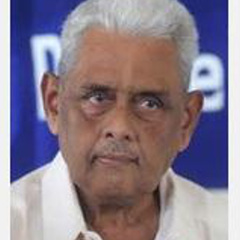I was in the tenth standard when India became independent. Those days, our classes started with the British national anthem. 'Vande Mataram' replaced 'God Save the Queen' on August 15, 1947. The tricolor soared in the independent sky. I was happy and proud. Expectations were high though the tide waned later.
When a country is subjected to foreign rule, its resources are looted and its pride and cultural heritage are lost. India's case was no different under the British domination through the East India Company. However, the British rule was not a curse in all aspects.
The modern education through English lifted India from the medieval religious morass to a modern state. A subcontinent divided into petty kingdoms came under a uniform legal system and education scheme. India had never been such a united entity.
The imperial authorities introduced the rule of law in place of the rule by the whims and fancies of the rulers. They also improved India's relations with the other countries and introduced lofty ideals such as democracy and secularism.
The new generation was inspired by the study of the evolution of parliamentary system as part of the British curriculum. The cultural renaissance and reforms movements breathed fresh air into the country’s soul. The Indian National Congress was formed in 1885 by a class trained in the British system.
Independent India stood a chance to rise to the forefront of world nations. Unfortunately, independence was accompanied by the Partition, as dictated by the two-nation theory propounded by the Muslim League. The creation of Pakistan on religious lines meant India was to live with a hostile neighbor.
Despite the nagging presence of Pakistan and the wars with the neighbors, India was on the path of progress by the end of the 20th century, thanks to universal adult franchise and a Constitution based on fundamental rights. Pakistan is still under the influence of its army.
The mixed economy helped India withstand global crises. Attempts to form a third group without aligning to the two dominant spheres catapulted India to a pride of place in international fora.
However, the Indian National Congress abandoned its heritage of the freedom movement and degraded to power politics. The party lost its popular base due to its dynasty rule. The left parties failed to be an alternative. Socialism remained a distant dream.
Extremist Hindutva, under the guise of Hindu nationalism, is trying to grow into the void. Hindu nationalism is nothing but Hindu communalism. The communal forces that capitalized on the vacuum left by the Congress have created uncertainty in society.
Even though we take pride in the democratic Constitution with fundamental rights, we are constantly under the fear of a subterfuge. India fears that its democracy could be overtaken by a new dictatorship.
We do not realize the value of the eye as long as we have it. So is the case of freedom.
Read more: Columns | Straight Talk

























 Hindu nationalism is nothing but Hindu communalism. Getty Images
Hindu nationalism is nothing but Hindu communalism. Getty Images